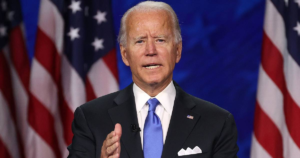
WASHINGTON (AP) — The attorneys general of Maryland and the District of Columbia hope a little-known clause in the Constitution will force President Donald Trump to separate himself from his businesses and release his tax returns and other financial information, contending in a lawsuit he is corruptible to foreign governments who make payments to his businesses from around the world.
The emoluments clause bars the president and other government employees from accepting foreign gifts and payments without congressional approval. A lawsuit filed in federal court in Maryland on Monday alleges he is violating the Constitution by accepting payments from foreign governments.
“We’re concerned that foreign governments are coming to the Trump businesses with a single purpose of currying special favor from the president of the United States so that their interest can get a higher priority than the interest of the American people,” District of Columbia Attorney General Karl Racine said at a news conference announcing the lawsuit. “If that’s not a harm to every American citizen and every resident in the District of Columbia and Maryland, I don’t know what is.”
Trump’s unique status as both president and the financial beneficiary of his global business empire raised questions about the emoluments clause of the Constitution even before he took office. Trump and his attorneys argue the clause does not cover fair-value transactions, such as hotel room payments and real estate sales.
The attorneys general aren’t the first to sue Trump over emoluments. Just days after Trump’s inauguration in January, the government watchdog Citizens for Responsibility and Ethics in Washington filed a federal lawsuit in the Southern District of New York. Since then, a restaurant group and two individuals in the hotel industry have joined as plaintiffs.
The Justice Department said Friday that those plaintiffs did not suffer in any way and had no standing to sue, and that it was unconstitutional to sue the president in his official capacity.
White House press secretary Sean Spicer noted that response at a White House briefing Monday.
“This lawsuit today is just another iteration of the case that was filed by that group CREW, filed actually by the same lawyers,” Spicer said. “So it’s not hard to conclude that partisan politics may be one of the motivations behind the suit.”
But the two Democratic attorneys general say their lawsuit is unique, because they are suing as sovereign entities on behalf of residents of Maryland and Washington, D.C. They say the Trump Hotel in the nation’s capital affects business in the Washington area.
Maryland Attorney General Brian Frosh also underscored that the framers of the Constitution included the clause for good reason.
“If the Justice Department is right, the emoluments clause has no meaning whatsoever,” Frosh said. “The president can stand over here with his president of the United States hat and he’s not allowed to take payments, but he takes a step over here and puts on his businessman hat they can funnel as much money to him as they want. You got no emoluments clause there, and it’s absolutely clear that the framers of the Constitution intended that to protect us from presidential corruption.”
The two attorneys general also hope the case will build a record against Trump through the discovery process in the court case. Frosh said the president has discussed some of his business dealings on the campaign trail, noting Trump’s mention that a state-owned Chinese bank has office space in Trump Tower in New York.
“He bragged about that on the campaign trail,” Frosh said. “I don’t think he’s giving it to them for free, and there are many sources that have given us information about the payments that he has received. We’ll have a lot more after we get discovery.”
Racine noted that the emoluments clause hasn’t been tested by the Supreme Court or federal circuit courts.
“And we think that our case will also further develop the record and the law for the court, which obviously will ultimately be the final arbiter, a necessary cog in the check-and-balance wheel,” Racine said.
The lawsuit also focuses on the fact that Trump chose to retain ownership of his company when he became president. Trump said he was shifting assets into a trust managed by his sons to eliminate potential conflicts of interest.
If a federal judge allows the case to proceed, Racine and Frosh say they will demand copies of Trump’s personal tax returns in court to gauge the extent of his foreign business dealings.
“Mr. Trump is unique in American history in violating the emoluments clause,” Frosh said. “There is no other president whose domestic and foreign investments, the entanglements, have been so bound up with our policy and our interests, and he is the only president who has refused to disclose the extent of his holdings and interests, so, yes, it will be a subject of our lawsuit. We will be seeking that information.”










More Stories
The Importance of HBCUs as They Grow in Popularity (VIDEO) – Scripps News
Biden Campaign Plans Black Media Rollout To Reach Black Voters – BET
Black college president says it's time to fix Black-Jewish relations – The Washington Post